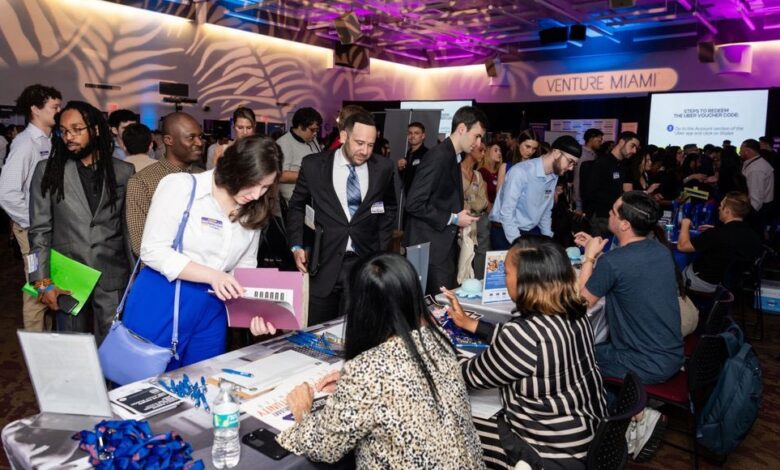The data is in: We have tech talent, but are not retaining it. Now what?

Miami Tech Works releases new Tech Talent Gap Report
By Nancy Dahlberg
Does the Miami metro area have sufficient tech talent to feed the needs into the future, and in areas we may not, where are the gaps? Let’s go to the data.
A new report explores the demand for tech jobs in our region, the supply of retained graduates to fill those jobs, and the gap that remains to be filled. Miami Tech Works, a collaborative initiative aimed at fueling the tech talent pipeline, commissioned the Tech Talent Gap Analysis to inform and develop data-driven solutions to increase the local talent pipeline entering our growing tech workforce.
The 75-page report conducted over a 5-month period and produced by TPMA, includes an environmental scan of the tech-related occupations in Miami, a stakeholders analysis, and recommendations to elevate Miami’s ecosystem. The report was informed by surveys and interviews with local jobseekers and employers, and the researchers attended both the Miami Tech Talent Summit and the Tech Hiring Fair in April, which attracted a wide range of employers from startups, to small businesses to large corporations.
The data show a significant gap in the number of job seekers coming from local educational programs who are entering into tech occupations with local employers. The report found that employers are importing talent to satisfy hiring needs, which suggests that more pathways are needed for graduating talent to win those jobs.
“It’s wrong to say that there is no talent in Miami; it’s wrong to say that academic institutions are not graduating enough talent. The report really is pointing to the extremely bad job that we’re doing in Miami retaining our graduates,” said Antonio Delgado, VP of Innovation and Tech Partnerships at Miami Dade College. “So the question is, why are they not getting a job in tech in the same career that they studied,- computer science, software engineering or data science, why?”
Local companies need to step up efforts to create entry level pathways for that talent to stay, Delgado said, and that is a big focus of Miami Tech Works.
What the gap report found
Miami Tech Works, an initiative powered by a $10 million 3-year grant from the US government, aims to tackle these challenges by bringing employers, academic institutions and training providers together to create these pathways for entry-level talent.
To use one example from the report, the county’s largest tech occupation category – software developers, programmers and testers – employs over 31,000 people. It is also the area’s fastest-growing category. The gap analysis showed that based on 10-year projections, to reach a balance between openings and retained graduates, retention rates of local talent will need to increase by 5% annually. To reach parity in 5 years, retention rates would need to increase by 20% annually.
In 2024, in the much smaller but high-potential data scientist category, there is a projected deficit of retained data scientists in the region of 368, an imbalance between supply and job opening demand that can be corrected by 2028 with a 35% annual increase in retained grads. To achieve balance by 2034, the number of retained regional grads must increase by 12% annually, the report said. One category the ecosystem is doing especially well in is tech sales; there is no gap found in that category.
“[Retention] is a systemic problem that we have in Miami, and the whole point is what can we do about it? How can we work better together to fix the problem?” said Delgado, whose institution spearheaded the Miami Tech Works grant that includes a number of local partners.
‘This is the moment to double down’
Key recommendations from the report include:
- Businesses must enhance training and internship programs to bridge skill gaps and foster local talent for industry needs, ensuring long-term success and economic growth.
- Higher education institutions must deepen their collaboration with employers to equip students with workforce-relevant skills and practical experience to better prepare them for the job market and regional economic development.
- Local government is pivotal in backing workforce development programs and fostering stakeholder collaboration, with a strategic focus on hiring incentives to boost local tech employment and promote inclusive growth.
- Workforce training providers should create impactful training programs like apprenticeships and bootcamps in collaboration with employers and educational institutions, offering young job seekers pathways to high-demand tech careers.
A key challenge in our region is affordability, a reason focusing on connecting job seeker to high wage occupations is critical. “Last, it is imperative that regional employers buy into hiring local talent,” the report said.
“We have seen enrollment numbers growing at the Knight Foundation School of Computer Science at FIU and Miami Dade College continues increasing tech programs by 10% every year. The community is going to the local academic institutions and training providers. People are desperate for those skills to get a high-paying job, what we continue lacking is that pipeline to get into a job,” Delgado said.
“This is the moment to double down and make it work,” he adds, acknowledging that a lot of work to solve this problem is underway.
Feedback and opportunities
Terri-Ann Brown, director of Miami Tech Works, said a key feedback from employers about hiring tech talent from academic institutions is that students come out with theory knowledge but not necessarily applicable knowledge on how to how to create these technology projects so they are ready from day one on the job. “We’re encouraging employers to work on work-based projects with academic institutions. We’re scoping out a lot of these projects with partners, especially in AI, cybersecurity and software development, so students have an opportunity to work on real case-based projects that are designed by employers that replicate what they would be doing on their job,” Brown said.
Some of the project ideas could be anything from creating an AI chat bot to predictive analytics or predictive pricing. They could take anywhere from 15 to 50 hours, she said.
Another challenge is employers are going offshore as a way to cut costs. That’s why one of the key recommendations was to enhance the connection between employers and training providers locally so they then hire local, Brown said.
What’s more, international talent is coming to Miami with the applicable skills already and employers could accept industry credentials and short term certifications to put them to work right away. “There just has to be conversations that happen and commitments made that agree upon what are those non-degree pathways to get people to work quickly,” Brown said.
The report shed light on the opportunity to increase gender diversity. “We definitely see an opportunity for the data scientist role. It’s one of the fastest growing and in-demand roles and region and we do see a trend that more women are occupying that role. There’s an opportunity there for employers to be more inclusive in those environments.”
The highest-earning occupation – computer and information systems managers – is also one of the least gender diverse occupation, providing an opportunity for training providers and employers to grow this talent pipeline, Brown continued.
What’s more, small businesses are looking at ways to compete against larger companies for talent. Offering a flexible working environment such as remote or hybrid work and wraparound services can be that way, Brown said. “Small businesses need to think creatively on ways that they can be welcoming to women. Women are definitely looking for more professional development, as well.”
As to the development of soft skills, Miami Tech works is partnering with the Project Management Institute to support students who work on these projects. “By the time the students have completed these projects, it’s almost as though they’re ready to become a certified project manager,” Brown said.
“Students have to be intentional about their learning journey. Businesses have to be intentional about their role in preparing talent and hiring talent. Training providers have to be intentional about preparing talent and engaging with businesses. And then community partners like government and agencies that support underrepresented talent have to be intentional about meeting the outcomes and engaging with all key stakeholders,” Brown continued. “Our [Tech Talent Coalition] working groups are all about piloting solutions and seeing how we can be innovative, connecting employers and training providers and students. I’d love to do this gap analysis again in two years and see that we’ve moved the needle.”
Employers can join the Miami Tech Coalition here and can specify a work group they are interested in.
“The Miami Tech Works Gap Analysis highlights the urgent need for all of the ecosystem members – businesses, educational Institutions and us as a local government – to collaborate more and create more support for workforce development. At Miami Dade County, we are really excited about intensifying training and internship programs, deepening partnerships, and helping employers with strategic hiring incentives that can promote and secure Miami’s tech talent pipeline and we are really proud of the work that Miami Tech Works and the Tech Talent Coalition, led by Terri-Ann Brown, are doing to drive these critical efforts forward and to make sure that employers are committed to hiring local talent across the county for inclusive growth and the long- term benefit of our economy,” said Miami-Dade County Chief Economic Development and Innovation Officer Francesca (Cesi) de Quesada Covey.
Photo at top of post shows a scene from the Venture Miami Tech Hiring Fair in April.
READ MORE IN REFRESH MIAMI:
Student success stories:
Recent ecosystem news:
- The data is in: We have tech talent, but are not retaining it. Now what? – June 17, 2024
- 8+ things to know in #MiamiTech: New tech HQ for Boca plus news from Superlogic, Woodrow, FAU, cybersecurity, tech jobs & more – June 16, 2024
- On a mission to transform chronic care, Better Health raises $14M from UHealth, others – June 14, 2024




